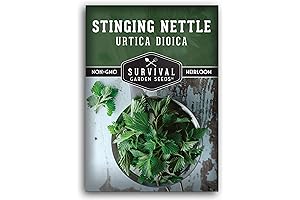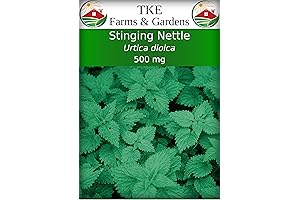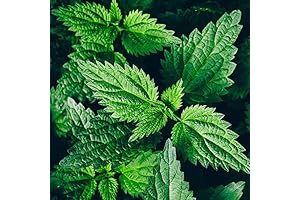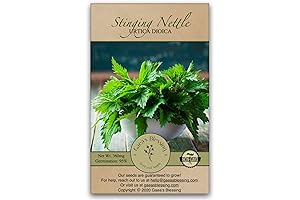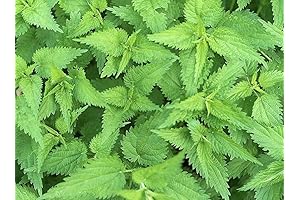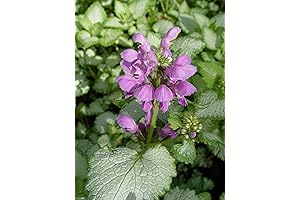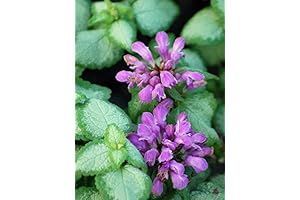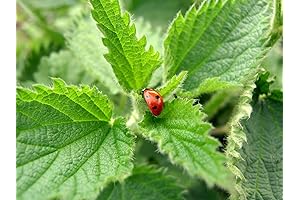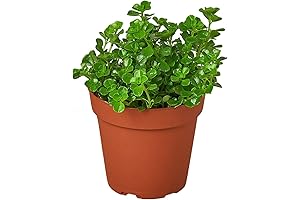· herbs · 14 min read
Top 5 Nettle Plant Seeds for an Enriching and Therapeutic Garden
Welcome to the realm of the nettle plant! Get ready to discover the 5 best nettle plant seed options that promise to elevate your home herb garden with a touch of nature's goodness. Join us as we explore their unique characteristics, planting instructions, and why they stand out in the world of herbal remedies.
Standing tall in the world of nature's wonders, the nettle plant is renowned for its medicinal prowess and culinary versatility. Its unique properties have captivated the interest of herbalists and gardeners alike, making it an indispensable addition to any home herb garden. To help you harness the power of this remarkable plant, we've meticulously curated the top 5 nettle plant seeds to guide you towards a flourishing garden experience.
Overview

PROS
- Excellent source of nutrients and antioxidants
- Easy to grow in a variety of soil conditions
CONS
- May cause skin irritation if handled without gloves
- Can spread aggressively, monitor and control the growth
Introducing the 1 Packet Stinging Nettle Seed for Planting - your gateway to cultivating the nutrient-rich medicinal herb, stinging nettle, right in your home herb garden. This non-GMO heirloom variety boasts a rich history of traditional medicinal uses and culinary applications.
With the included instructions to plant and grow, you'll embark on an effortless journey to cultivate this remarkable plant. Stinging nettle thrives in various soil conditions, making it an ideal choice for novice and experienced gardeners alike. Not only will you have access to fresh, nutrient-dense leaves, but you'll also enjoy the satisfaction of growing your own herbs.

PROS
- Abundant Heirloom Seeds: 2000+ seeds per packet ensure ample supply for your gardening endeavors.
- Nurture a Medicinal Garden: Cultivate your own versatile nettle plant, renowned for its health benefits.
CONS
- Requires Specific Growing Conditions: Stinging nettle plants favor moist, shady environments, which may not be readily available in all locations.
Embark on a botanical adventure with our premium Stinging Nettle Seeds. This heirloom variety offers an impressive yield of over 2000 seeds, providing you with ample supply for your gardening pursuits. Known for its medicinal properties, the stinging nettle plant is a welcome addition to any herbalist's garden. Its leaves, rich in essential vitamins and minerals, have been traditionally used to treat a wide range of ailments.
Growing stinging nettle requires specific environmental conditions. These resilient plants thrive in moist, shady areas, so ensuring their optimal growth may require some adjustments in your garden. Nonetheless, with proper care and attention, you can cultivate a thriving nettle patch that will provide you with a steady supply of this versatile herb. Whether you seek its culinary or medicinal benefits, our Stinging Nettle Seeds empower you to cultivate nature's healing power in the comfort of your own garden.

PROS
- Ample seed count (5000) for a robust and flourishing nettle patch.
- Perennial nature ensures years of harvesting, minimizing the need for frequent replanting.
CONS
- Some knowledge of nettle plant handling is recommended as it can cause skin irritation when touched barehanded.
Immerse yourself in the world of medicinal and culinary delights with the Perennial Urtica Dioica Stinging Nettle Seeds. This remarkable plant has been revered for centuries for its therapeutic properties and culinary versatility. The generous seed count ensures a lush growth, providing ample supply for your herbal remedies and culinary creations.
As a perennial, the nettle plant will grace your garden for years to come, eliminating the hassle of annual replanting. Its resilience ensures a reliable source of nutrient-rich leaves for teas, tinctures, and culinary preparations. Remember, while the nettle is a treasure trove of health benefits, handling it with care is essential due to its characteristic ability to cause skin irritation. By donning gloves during harvesting, you can safely harness the healing and culinary powers this plant holds.

PROS
- Certified organic and non-GMO
- 500 seeds per pack (0.1 grams)
- Easy to grow and care for
- Can be used for medicinal purposes or as a natural fertilizer
CONS
- May cause skin irritation if handled without gloves
- Needs full sun to partial shade to thrive
The Organic Stinging Nettle Seeds (Urtica dioica) are an excellent choice for those looking to grow their own stinging nettle plants. These seeds are certified organic and non-GMO, ensuring that you are getting a high-quality product. Each pack contains 500 seeds (0.1 grams), which is more than enough to get started. The seeds are easy to grow and care for, making them a great option for both beginners and experienced gardeners. Stinging nettle plants can be used for medicinal purposes or as a natural fertilizer, making them a versatile addition to any garden.
One of the best things about these seeds is that they are very affordable. You can get a pack of 500 seeds for less than $10. This makes them a great value for the money, especially when you consider how many plants you can grow from a single pack. The seeds are also very easy to grow. You can simply sow them directly in the ground or start them indoors in pots. Once they have germinated, they will grow quickly and easily. Stinging nettle plants are very hardy and can tolerate a wide range of growing conditions. They prefer full sun to partial shade and well-drained soil, but they can also tolerate some drought conditions. Overall, the Organic Stinging Nettle Seeds (Urtica dioica) are a great choice for anyone looking to grow their own stinging nettle plants. They are affordable, easy to grow, and versatile. Whether you are looking to use them for medicinal purposes or as a natural fertilizer, these seeds are a great way to get started.

PROS
- 95% germination rate for reliable growth
- Non-GMO seeds ensure natural and safe cultivation
CONS
- Requires specific growing conditions, may not thrive in all climates
- Nettle plants can be invasive, requiring careful management
These nettle plant seeds offer a unique opportunity to cultivate your own stinging nettle plants. With a remarkable 95% germination rate, you can expect successful growth, providing you with an ample supply of this versatile herb. Being non-GMO, these seeds guarantee a natural and safe growing experience, free from genetic modifications. Whether for culinary, medicinal, or landscaping purposes, these nettle seeds are an ideal choice.
Growing stinging nettle plants requires specific conditions, so it's essential to research their optimal environment before planting. Keep in mind that nettle plants can be quite invasive, spreading quickly and potentially becoming a nuisance in your garden. To ensure controlled growth, proper management and containment measures are advisable. With proper care and attention, these nettle plants can thrive, offering you the benefits of this traditional herb.

PROS
- Rooted in natural healing, the Stinging Nettle Plant Roots offer a plethora of health benefits.
- Cultivate your own medicinal garden with these potent roots, rich in vitamins and minerals.
- Their stinging properties stimulate circulation and promote overall well-being.
CONS
- Wear gloves when handling the roots due to their irritating sting.
Discover the hidden powers of nature with our 5 Stinging Nettle Plant Roots. These bare root wildflowers, known as Urtica Dioica, hold a rich history of medicinal use. Their presence in your garden will not only add a touch of wild beauty but also provide you with an abundance of health benefits.
Embrace the healing properties of stinging nettle. Its potent roots are a treasure trove of vitamins and minerals, including vitamin C, iron, and calcium. When properly prepared, stinging nettle roots can alleviate various health conditions, from reducing inflammation to supporting urinary tract health. Additionally, their unique stinging properties stimulate circulation, promoting overall well-being.

PROS
- Remarkable purple flowers that add a splash of color to any garden
- Thrives in both partial shade and full sun, making it versatile for various landscapes
CONS
- May require occasional deadheading to maintain its neat appearance
- Can spread aggressively, so some monitoring and control may be necessary
Prepare to be mesmerized by the Lamium 'Orchid Frost'! This eye-catching perennial boasts an array of purple flowers that will captivate your senses. Its versatile nature allows it to thrive in both partially shaded and sun-drenched areas, making it an ideal addition to any garden.
The unique characteristic of Lamium 'Orchid Frost' is its способность to add both visual interest and ground cover to your landscape. Its low-growing form and trailing stems create a beautiful tapestry that will undoubtedly elevate the aesthetic appeal of your garden. Don't miss out on the opportunity to incorporate this charming plant into your outdoor oasis.

PROS
- Mesmerizing silver-white leaves create a captivating tapestry in your garden.
- Vibrant pink blooms add a dash of color and attract pollinators.
CONS
- Prefers partial shade areas to thrive.
- Can spread quickly, requiring occasional containment.
Prepare to be enchanted by the Lamium 'Beacon Silver' (Dead Nettle) Plant, a visual masterpiece that will elevate your garden's aesthetics. Its striking silver-white leaves, resembling a metallic shimmer, form a breathtaking carpet-like groundcover. When springtime arrives, it bursts forth with charming pink flowers, attracting a chorus of pollinators to your outdoor haven. This versatile plant thrives in partial shade and can tolerate a range of soil conditions, making it a low-maintenance addition to your garden sanctuary.
However, it's worth noting that the Lamium 'Beacon Silver' is a vigorous grower. Its spreading nature may require occasional containment to prevent it from taking over your garden beds. Additionally, while it can withstand some sun exposure, it prefers the shelter of partial shade to truly flourish. Embrace this captivating plant, and your garden will be adorned with a silver splendor that will leave you breathless.

PROS
- Non-GMO, heirloom seeds ensure genetic purity and promote sustainable gardening.
- Open-pollinated seeds allow for easy seed saving and propagation.
CONS
- Seeds require specific growing conditions, including moist, well-drained soil and partial shade.
- Stinging nettles contain tiny hairs that can cause skin irritation upon contact.
Embrace the power of nature with our Stinging Nettle Seeds, carefully sourced for their exceptional quality. These non-GMO, heirloom seeds guarantee genetic purity, promoting a sustainable gardening ethos. Their open-pollinated nature empowers you to effortlessly save and propagate seeds, ensuring a continuous supply of this valuable plant.
While stinging nettles possess remarkable medicinal properties, it's crucial to exercise caution when handling them. The plant's tiny hairs can trigger skin irritation upon contact, so gloves are highly recommended. Despite this minor inconvenience, stinging nettles offer a wealth of benefits for both your garden and your well-being. Plant these seeds in moist, well-drained soil under partial shade, and witness the beauty of nature unfold as they thrive, adding a touch of wild charm to your gardening haven.

PROS
- Versatile plant with a wide range of uses, including medicinal, culinary, and cosmetic applications.
- Contains high levels of vitamins, minerals, and antioxidants.
- Traditionally used to treat a variety of ailments, including skin conditions, digestive issues, and inflammation.
- Can be grown indoors or outdoors, making it easy to incorporate into your daily life.
CONS
- Some people may experience allergic reactions to nettle plants.
- Wild nettle plants can have stinging hairs that can cause irritation.
- The flavor of nettle can be slightly bitter, which may not be to everyone's taste.
Nettle plants, also known as Urtica dioica, are a versatile and fascinating species with a wide range of potential benefits. These plants have been used for centuries in traditional medicine, and modern research is beginning to uncover the scientific basis for their traditional uses.
Nettle plants are rich in vitamins, minerals, and antioxidants, including vitamin C, iron, calcium, and potassium. They also contain several bioactive compounds, including chlorophyll, flavonoids, and phenols, which have been shown to have a variety of health-promoting effects. Nettle has been traditionally used to treat a variety of ailments, including skin conditions, digestive issues, and inflammation. Some studies have found that nettle may be effective in reducing the symptoms of allergies, arthritis, and diabetes.
We've reached the end of our exploration into the world of nettle plants. As you embark on your gardening journey, remember that with the right care, your nettle plants will thrive, offering you a wealth of benefits. Whether you seek natural remedies or culinary delights, we hope this guide has inspired you to incorporate the nettle plant into your home herb garden. Happy planting and enjoy the rewards of nature's medicinal wisdom!
Frequently Asked Questions
What are the benefits of growing nettle plants?
Nettle plants are treasured for their wide range of benefits, both medicinal and culinary. Their leaves, when processed properly, can be enjoyed as a nutritious tea, offering potential relief from allergy symptoms, joint pain, and skin conditions. Additionally, nettle plants can serve as natural fertilizers, enhancing the growth of other plants in your garden.
Do nettle plants require special growing conditions?
Nettle plants are relatively easy to grow and can thrive in various conditions. They prefer well-drained soil and partial shade, making them suitable for a range of garden environments. While they can tolerate full sun, providing some shade will help prevent the leaves from becoming too tough.
How long does it take for nettle plants to grow?
From seed to harvest, nettle plants typically take around 3 to 4 months. However, the exact growth time may vary depending on the specific variety and growing conditions. Nettle plants are known for their rapid growth rate, allowing you to enjoy their benefits within a relatively short period.
Can stinging nettle plants be used in cooking?
Yes, stinging nettle plants can be safely consumed after proper preparation. The young leaves and shoots of stinging nettle plants are particularly popular in various culinary applications. They can be added to soups, stews, and salads for an extra boost of nutrition and flavor. Remember to wear gloves when handling the leaves, especially during harvesting and preparation.
Are nettle plants poisonous?
While stinging nettle plants can cause skin irritation due to their tiny hairs, they are not considered poisonous. The burning sensation and itching typically subside within a few hours. If you are concerned, consider wearing gloves when working with the plant, especially during harvesting or weeding.
